- Home
- Julie Berry
The Amaranth Enchantment Page 5
The Amaranth Enchantment Read online
Page 5
“Lucinda,” I said.
“Should I pity you, Lucinda?” she asked.
I sat very still, feeling pricked by her question. Perhaps I pitied myself, but I didn’t need her to.
“No.”
She nodded her head, as if my answer pleased her. “And yet,” she said, “you have bruises on your face that weren’t there yesterday.”
I hadn’t known they showed.
“Was it your aunt?”
There was no need to answer.
I was startled to see the great sadness written on her face. She rose from her chair and approached mine.
“May I?” she said. She knelt before me and slowly placed her hands over my eyes and cheeks. Her hands were cool, the skin taut and fine over hard muscles and bones. At her touch, the wounds stung and burned, until a sweet numbness came over them. She pressed more firmly, then removed her hands.
My breath came fast and heavy. I patted my face. It was warm, no longer numb or hurt.
“Are the bruises gone?” I asked.
She nodded.
I couldn’t believe what had just happened. Who was she? “Thank you,” I said, not without some fear.
“You are welcome.”
“Is this why they call you Amaranth?” I said. “You can heal yourself, so you don’t seem to get older?”
She smiled. “I chose the name, actually. It seemed to fit. I loved the flower because it reminded me of home. I called myself Amaranth in a town where I lived for a time, and the name stuck when I traveled here.”
I tried to gather together the things I knew, or thought I knew, about her.
What else had Father Julian said? “Did you really curse the queen when she was expecting a child?”
She sagged in her chair. “The only person I’ve ever cursed is myself. No,” she said suddenly, “I must amend that. There are two others. But neither of them was the queen. She was simply unlucky.”
I sat, wondering how she could have cursed herself. Her words interrupted my thoughts.
“I told your aunt that I was looking for a servant,” Beryl said, “but that was not quite true. I am looking for help of a different kind, and when I saw you, I felt you could be just the person I needed.” She stroked her fingertips across her collarbone, as if searching for something that wasn’t there.
“I don’t know how I could help you, unless you want your floors scrubbed. You’re… well, if you’re not a witch, you’re something. There’s nothing I could do that you could not.”
She sat silently. I waited for her to say something. I’d nearly given up when she spoke.
“Do you know what it’s like to be alone, Lucinda?” This question wasn’t what I’d been expecting. It made me stop and consider.
“I’ve been alone since my parents died, mostly,” I said. “Uncle was good to me, but Aunt made it hard for both of us. I’ve never had friends to speak of.”
She leaned forward in her chair, gripping the armrests. “That makes two of us, utterly alone, doesn’t it?”
The wind pouring through broken windowpanes blew cold over my skin. “I suppose it does.”
“What would you give to have a friend? One true friend, who would never leave you?”
“I suppose I’d give a lot for that.” My mouth felt dry, parched. I wanted to end this interview. “You said there was something you needed from me?”
A flicker of disappointment crossed her face, then it was gone. “Yes. Well.”
She folded her hands in her lap and sat more erect, businesslike. “Where is my stone?”
Hope sank like a stone in my stomach. I had hoped that maybe the subject wouldn’t come up again. “I don’t know.”
Outside on the lawn, Dog bleated. Beryl rose from her chair and stood at the window, looking down on the grounds. Moonlight on her pale features turned her into a marble sculpture. She kept her eyes fixed on some faraway sight—perhaps the sea.
I joined her at the window, drawn by curiosity. Saint Sebastien sparkled like a field of stars, and beyond it lay the deep black of the ocean.
“Who is this Peter that you mentioned?”
“I hardly know him,” I said. I told her the story of how Peter came bursting into the room, spent the night, and disappeared, leaving a pebble in my pocket. Beryl listened intently, frowning more and more as I went on.
She seized my arm. “Lucinda,” she said, when I was finished, “the day you wandered about the city, when your aunt and uncle had asked you to return the stone, but you didn’t”—I felt my cheeks getting red—”did anyone approach you, or talk to you, or any such thing?”
I thought I knew where she was headed—that perhaps the stone had been stolen before Peter came.
“No,” I said, “not a soul. And anyway, I had the stone in my room that night. I remember looking at it. It almost felt… alive.”
Beryl clenched and unclenched her fists, growing more agitated by the minute.
“It doesn’t seem as if… it doesn’t sound like… could it be?” She was talking to herself now.
“Could it be what?”
Her eyes met mine. “Twice, in the city, someone has tried to steal the stone from me,” she said. “A man. That’s how the setting broke. I took it for repair in part to put it beyond the thief’s reach. But I don’t know who the thief is.”
I began to see the cause of her fear. “You think Peter was working for someone else?”
She pressed her lips together tightly. “I hope not.”
I searched back in my mind, thinking of the night he came. “I’m sure it isn’t so,” I said. But whether it was or no, what could I do about it?
Beryl began pacing the floor. “We don’t know for certain that Peter took it, but it seems the most probable,” she said. “And we don’t know where he is, or how to find him, but we know he frequents the city streets, yes?”
I nodded.
“And he’s likely to be out and about during the Winter Festival, would you say?”
I nodded again.
“Do you think you could find him and get it back from him?”
I laughed. “Not a chance! He’s as slippery as a tadpole!” Beryl leaned forward once more, her violet eyes seeming to have a light of their own.
“What if,” she said, biting off each word deliberately. “What if I gave you something in return?”
She had my attention. But still, there was no way I could get the stone back from Peter.
“What if I gave you this house in return for my jewel?” A cold breeze from the window blew over me, but I was already frozen with shock.
My house?
It was impossible!
My chances were miniscule at best.
Yet, the fact that there was a chance at all was irresistible.
She watched my face closely, apparently concerned that I hadn’t answered yet.
“And,” she added, as if to sweeten the deal, “all the gold you’ll ever need to live here comfortably for the rest of your life.”
I laughed out loud. The absurdity of it all was too much. She thought the first offer wasn’t good enough for me? What else might I throw into this bargain—a royal crown?
“Where did you get such wealth? And what in heaven’s name is this stone of yours?” I asked. “It’s rare, I know, and huge, and priceless, even I can see that. But how could it be worth so much to you?”
A cloud passed over the moon, leaving us standing in darkness. I couldn’t see Beryl at all, nor even hear her breathing. For an odd instant, I imagined she was no longer there—that she was a ghost or a vision who had vanished.
Then she spoke.
“Would you believe me if I told you that the stone is… how shall I describe this, the words are so shallow… that the stone is my soul?”
I heard my heartbeat thrum in my ears. What could I say to that? “I am listening.”
“Yes,” she said bitterly, “I know you are. But you’re not believing.”
Was I not?
&
nbsp; “I am trying to,” I said. “It’s much to believe.”
The clouds passed before the moon, and Beryl appeared again, ghostlike. Her arms were wrapped tightly around her body, as if it took all her strength to hold herself together in one piece. One fist she pressed into her lips and chin as if she were trying to knead away a toothache.
“I’ve said too much already,” she said miserably. “You couldn’t possibly understand, much less believe me.”
I reached forward and touched her arm. She was cold and hard, yet pulsing with life, just like her stone had been. The feel of her skin unnerved me. She jumped a little at my touch, and met my gaze. I pulled my hand back.
“Who are you?” I said.
“Do you mean, what am I?”
I nodded. “I suppose I do.”
She looked back out over the sea. “I am someone very lonely.”
I reached out again, and this time I didn’t flinch. “You can trust me, Beryl,” I said. “I won’t hurt you.” I took a deep breath. “And I’ll try to believe.”
She gripped my hand so tightly, I had to stifle a squeak. She looked down at my hand, held in hers.
“You’re cold. Come downstairs. We can build a fire, and I will try to tell you.”
Chapter 10
We sat by the fireplace in the drawing room. Beryl lit a fire from the dusty logs in the grate while I threw back the canvas drapes that covered the nearest couch. I sat on one end, watching as she lit the tapers on a pair of candelabra and set them on the mantel.
The walls were covered in paintings, from the chair rail up to the ceiling. A few were portraits of my family, but the rest were different, in a style like nothing I’d ever seen. The colors were intense, deep reds and blues, plays of dark and light in stark contrast, and the people in the paintings were not sitting still for portraits, but doing things—throwing javelins, tossing laughing children in the air, stroking animals, gathering fruit. I had never seen such lifelike paintings. No, that was not correct. Those people weren’t lifelike. They were more alive than life.
They were people like Beryl.
Over the mantel was a painting I did not recognize. I approached to study it.
A reclining figure sat by a stream, surrounded by luxuriant blossoms of purplish red. His smiling face was the picture of youthful beauty and vitality. It struck my heart. I turned and sat on the couch.
Beryl sat on the other end of the couch and looked at her hands in her lap.
Dog, whom I’d insisted should come in, sat on my feet and chewed the canvas drape that lay on the floor.
The fire crackled. Candlelight wavered on the walls, where gilding on the plaster scrollwork had begun to peel. How Mama would feel to see the cobwebs, I hated to think.
Beryl seemed lost in thought. Her face, so pale in the moonlight, now took on the amber color of firelight.
“What was it you wanted to tell me?” I ventured at last.
Beryl nodded, as if resigning herself to what she was about to say, despite her better judgment.
“To tell you who I am, I must tell you about the place I come from.” She smiled. “It’s probably no surprise to you to hear me say that I am not from the kingdom of Laurenz, nor any place near here.”
No surprise, indeed. That was a bit of an understatement.
“Do you believe in heaven?”
I blinked. “Are you saying you came here from heaven?” Beryl looked alarmed.
“Certainly not. I’m trying to figure out your beliefs, your thoughts about… this world, and… other places besides this world. Like heaven. But not heaven.”
“You’re confusing me.”
“I’m sorry. It’s… let me try it this way. You live on this earth, you watch your sun rise and set, you see your moon at night, and all the stars.”
I nodded.
“I come from a place that isn’t part of this earth. Our sky holds a different sun and moons and stars.”
A different sun? Moons? I tried to push my mind past that. I had promised to listen and try to believe.
Beryl watched my face anxiously.
“Go on,” I said.
She seemed relieved, and she plunged on. “Perhaps it’s wrong of me to tell you much. Perhaps it’s unfair. Perhaps if I tell you about my home, I will be responsible for burdening you… for infecting you with my own misery. But how else can I explain?” She worried a silk handkerchief with her hands. It tore like old paper.
She saw the shreds in her lap and sighed.
“If I had my stone, I could show you.” She looked up, a new hope in her eyes.
“Can we find it first, and then I can show you everything?”
I looked at her, bewildered and unsatisfied.
“Please?” she said, almost timidly.
I looked over at the wall of paintings and saw one of a little girl with thick dark curls tumbling helter-skelter around her face.
She was wearing a pauper’s dress, and kneeling on the ground in a forest. All around her was the beauty of a forest in spring, with dewy violets and snowdrops blossoming at her knees, but her face was fixed in a mask of despair. Quite a contrast from the smiling youth beside the stream. And yet, there was something similar in their faces.
“Did you paint these pictures?” I asked.
“All except the ones your mother painted,” Beryl said.
I kept my face trained toward the wall. “Can’t you tell me anything about the stone?”
Dog stood up and stretched, then leaned back on his haunches and placed both his hooves on my lap. He cocked his head to one side and peered at me through one of his devil’s eyes. If goats could talk, I’d feel sure this one wanted to.
“It has tremendous power,” Beryl said. “Without it I’m a shadow of myself.”
I pondered this and stroked Dog’s nose.
“How so?” I asked. “What does it do?”
She shook her head. “The stone, by itself, does nothing. It magnifies the soul of the bearer. Whatever seeds they have in themselves, the stone grows the fruit. It helps the mind open doors to the past, to other worlds, to souls themselves. It gives the bearer a clearer understanding, a fuller memory. If they are capable of happiness, the stone brings them joy.”
I thought of the statues that guard the churches in the city, the stone carvings of glorious beings that are said to move as lightning and speak as thunder. It wasn’t hard to picture Beryl’s marble form among them.
“It turns you into an angel,” I said.
She blinked, startled, as if seeing me for the first time. Then she sighed and shook her head bitterly. “If so, then, a fallen angel now.”
She looked away.
“Will you ever grow old and feeble?”
“No.”
“Will you ever die?”
“No.”
I felt a thrill of fear prickle across my whole body. Someone who would never die. I shouldn’t believe her, but I did. Dog clambered into my lap.
“Such a doggy,” I scolded, scratching behind his ears.
I looked back at Beryl. She was watching Dog with an odd, curious expression.
“Why are you here, Beryl, if this isn’t the world where you belong?”
She seemed to search for an answer, gathering words gradually.
“Others have come before. Banished from my world, some have arrived here as a punishment. I wasn’t banished. I came when I was very young. It was an accident, though, I’m not without blame.”
I couldn’t see this flawless, ageless person carrying such a thing as blame.
There she sat, looking more regal and graceful than any queen I could imagine—good heavens, just picture fat and jolly Queen Rosamond, for instance—how could it be? Blame was for the rest of us. Not someone like Beryl.
“How does one travel from your world to mine?”
She smiled for a moment. “You will think I’m joking.”
I urged her on. “No, I won’t.”
She gave up. “Down a well.
”
“Down a well?” Evidently I’d lied. She must be joking.
She laughed faintly. “In your world, you have prisons for your little crimes, and gallows for your great ones. In our world, little crimes are few, and great ones almost none, but when they do happen, we would not kill the guilty even if we could. We send them away. Banish them. There is a well in my world, in the shadow of a mountain. When someone goes down that well, they travel to some other world—I believe not always the same one.”
I was transfixed by her words. “And?”
She shook her head wearily. “And, I was curious about it. In the past, whenever anyone was banished—and it’s so rare, Lucinda, so rare!—they go unwillingly, so it takes another to go with them, to force them down the well, making sure their banishment succeeds. It means that one member of the community must sacrifice themselves for the sake of the rest. It’s horrible.” She rested her face in her hands, as if she couldn’t face herself. “Yet I went down the well myself. Stone and all. I wasn’t planning to, at first. I just wanted to take a look. But I looked down the well, and I could hear sounds, great noises from far away, like the noises of many worlds rolling through space together. They called to me. I jumped in. And here I am.”
I didn’t know what to say. I wrapped my arms around Dog’s neck and squeezed him. He lovingly ate my hair in return.
“I was a little girl, Lucinda. I’d been out filling my pockets with colorful pebbles from the stream. I followed the stream until it reached the valley of the stones and the well. I was so small, I crawled underneath the fence that guarded the well.”
I watched the fire smolder down, felt the waves of heat it threw my way, red heat pulsing through the black embers. Was our world really such a prison? We had comforting fires and warm lap goats.
“Can’t you go back?” I asked.
Her long lashes grew wet. “Not anymore.”
“Because you were wrong to come?” I asked. She said nothing. “Because you don’t have your stone?”
She pressed her lips tightly. “I would need it, yes, but that’s not the reason, or I’d have gone back long since.” She shook her head. “I can’t go back because I’m guilty. They would strip me of my stone and banish me. So I remain here, banishing myself, but at least I’ve had the comfort of my stone.”

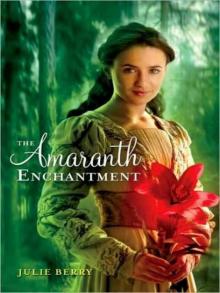 The Amaranth Enchantment
The Amaranth Enchantment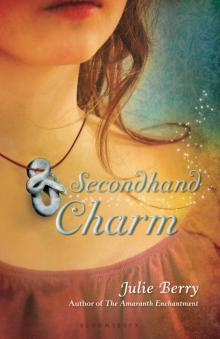 Secondhand Charm
Secondhand Charm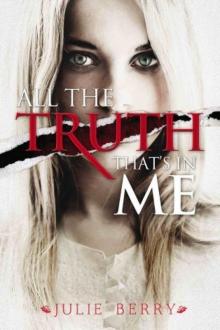 All the Truth That's in Me
All the Truth That's in Me Lovely War
Lovely War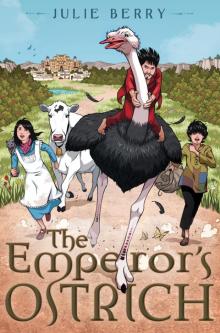 The Emperor's Ostrich
The Emperor's Ostrich The Passion of Dolssa
The Passion of Dolssa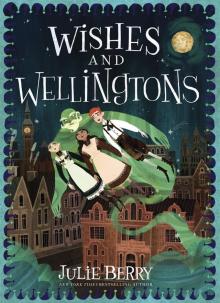 Wishes and Wellingtons
Wishes and Wellingtons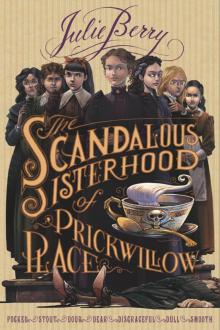 The Scandalous Sisterhood of Prickwillow Place
The Scandalous Sisterhood of Prickwillow Place Amaranth Enchantment
Amaranth Enchantment